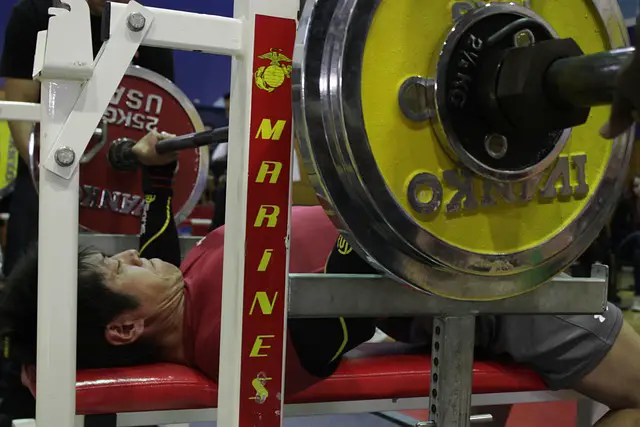Bench pressing is a popular exercise that is used to build upper body strength and size. It is a fundamental exercise that is performed by athletes, bodybuilders, and fitness enthusiasts alike. However, to properly track progress and avoid injury, it is important to know the weight of the bar you are lifting. The standard bench press bar weighs 45 lbs and has a weight capacity of up to 1620 lbs.
While the standard bench press bar is widely used, there are different types of bench press bars available that can target different muscles and reduce the risk of injury. These specialty bars vary in weight and design, and are often used by experienced lifters to add variety to their workouts.
In this article, we will explore the different types of bench press bars and their weights, as well as the benefits of using them. Whether you are a beginner or an experienced lifter, understanding the different types of bench press bars can help you optimize your training and achieve your fitness goals.
Types of Bench Press Bars
Various types of bench press bars are available in the market, each with its own unique features. These bars are designed to cater to the specific needs of the lifter. The most common types of bench press bars are the standard barbell, female bars, and training bars. Specialty bars, such as the Cambered Swiss Bar and the Duffalo Bar, are also available for those looking for a different lifting experience.
Choosing the right bar for your goals is key to ensuring that you get the most out of your bench press. For beginners or those lifting lighter weights, a female bar or a training bar is a good option. Those looking to reduce load on their shoulders and arms can benefit from specialty bars. However, it is important to note that these bars may not be suitable for everyone.
It is advisable to seek the advice of a certified trainer or coach before incorporating these bars into your training regime.
Benefits of Bench Press
The use of a standard barbell in strength training sessions can result in overall improvement of size and strength. Bench pressing with a standard barbell allows for the activation of numerous muscles in the upper body, including the chest, shoulders, and triceps.
Additionally, the use of a standard barbell allows individuals to lift heavier loads as they progress in their training, ultimately leading to greater strength gains. Improving form can also be a benefit of bench pressing with a standard barbell.
The straight, even distribution of weight on the bar allows for a more stable lift and can help individuals maintain proper form throughout the movement. Additionally, the use of a standard barbell can increase endurance by allowing individuals to perform a greater number of reps or sets, leading to improved muscular endurance over time.
Overall, the use of a standard barbell in bench pressing can lead to significant strength and size improvements, as well as form and endurance benefits.
Author Information
Joseph Lucero is a well-respected figure in the strength and conditioning community, with a master's degree and CSCS certification. He is also the author of several books on strength training and the owner and operator of PowerliftingTechnique.com, where he participates in affiliate programs with various sites.
Through his website, he provides instructional content on various strength training techniques, including bench press techniques that can help reduce shoulder injury.
In addition to providing instructional content, PowerliftingTechnique.com also uses cookies and web beacons to collect information from its visitors for measurement services and targeted ads. This is a common practice in the online world, and one that is becoming increasingly important for businesses looking to reach their target audience.
By participating in affiliate programs and using targeted ads, Lucero is able to monetize his website while still providing valuable content to his readers.
Miscellaneous Information
It is common for third parties to use cookies and web beacons to collect information from PowerliftingTechnique.com and other websites on the internet for measurement services and targeted ads. While this may raise concerns for some, it is important to note that standard privacy policies are in place to ensure that personal information is not shared or sold to other parties. In addition, users can opt-out of targeted ads through their browser settings or by using ad-blocking software.
When it comes to bench press bars, weight differences can greatly affect the workout experience. Specialty bars, for instance, offer advantages such as reduced load on shoulders and arms, while also targeting different muscles in the body.
The Cambered Swiss Bar, for example, is bent with different grips for various bench pressing techniques, while the Duffalo Bar is longer and curved instead of straight. By understanding the weight differences and benefits of each type of bench press bar, users can tailor their workout to their specific needs and goals.
Summary And Conclusion
Bench press is considered the king of all upper-body lifts, and to track your gains accurately, you need to know the weight of the bench press bar. The standard weight of a bench press bar is 45 pounds (20.4 kg), while the standard female bar weighs 35 pounds. The weight of a specialty bar can vary from 33 to 55 pounds depending on the shape and size of the bar. In this article by PowerliftingTechnique.com, readers will learn about the different types of bench press bars, their weight, and how to choose the right one based on their training goals.
A traditional bench press bar is approximately 7 feet long, made of steel, and can hold up to 1620 pounds, depending on the brand. The standard bench press bar is a straight barbell, but some bars are designed differently to improve various aspects of the performance. For example, the Cambered Swiss Bar is bent and has different grips to use for various bench pressing techniques. This bar allows you to place your hands in a neutral grip position with your palms facing each other, reducing the chances of shoulder injury. On the other hand, the Duffalo Bar is much longer than the traditional bench press bar because it is curved instead of straight. This bar helps improve the athlete's range of motion and reduces the force on the shoulders, biceps, and triceps.
For most people, the standard barbell of 45 lbs is sufficient for their bench pressing needs. However, women or those lifting lighter weights could benefit from a 35-lb bar. Additionally, specialty bars can be a great investment for your home gym if you want to reduce the load on your shoulders and arms. When choosing the right bench press bar, you should consider your body weight, age, and training goals. It is important to understand how much weight to put on the bar and how to train effectively for either building size or strength.
In conclusion, knowing the weight of the bench press bar is crucial for tracking your gains accurately. The standard bench press bar weighs 45 pounds, while a specialty bar can range between 33 and 55 pounds. Choosing the right bench press bar depends on your training goals and considering your body weight and age to determine how much weight to put on the bar and how to train effectively. Anyone can benefit from using a standard barbell to bench press, not just athletes.
Frequently Asked Questions
Are there any bench press bars specifically designed for people with shoulder injuries?
Alternatives for injuries include shoulder friendly bars that reduce stress on the shoulders and arms. Cambered Swiss Bar and Duffalo Bar are examples of specialty bars that allow for different grips and techniques to hit other muscles while minimizing injury risk.
How do you properly grip the Cambered Swiss Bar for bench pressing?
The proper grip for using a Cambered Swiss Bar for bench pressing techniques involves placing the hands in a neutral position, with the thumbs wrapped around the bar. This grip can help reduce shoulder stress and improve muscle activation.
Can using specialty bars help improve overall bench press form?
Using specialty bars can benefit bench press form by reducing load on the shoulders and arms, providing different grips for various techniques, and targeting different muscle groups. This can lead to increased strength and reduced risk of injury.
Does the weight of the bench press bar affect the muscles targeted during the exercise?
The weight of the bench press bar does not significantly affect the muscles targeted during the exercise. However, using variations such as specialty bars can alter muscle activation and assist in reducing shoulder and arm load.
Is it necessary to use the standard 45 lb bar for bench pressing or can other bars be used instead?
Alternative bars can be used for bench pressing, including lighter bars that offer benefits such as reduced load on the shoulders and arms. Starting with a lighter weight and building up can improve overall strength.



